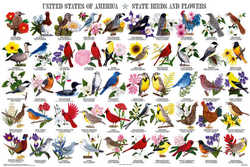Idaho State Bird
Mountain Bluebird (a small thrush)

(Sialia arctcia)
Adopted on February 28, 1931.
The Mountain Bluebird, (Sialia arctcia,) was adopted as the Idaho state bird by the state legislature on February 28, 1931. The Mountain Bluebird is a medium-sized thrush that breeds in open country across western North America, including mountain areas.
Few birds are held in higher esteem than the bluebird. In poetry and prose, the bluebird is always a symbol of love, happiness, and renewed hope.
Idaho State Bird: Mountain Bluebird
Three species of bluebird are found in North America:
1.) the Mountain Bluebird, Sialia currucoides (Sialia arctcia)
2.) the Eastern Bluebird, Sialia sialis, and
3.) the Western Bluebird, Sialia mexicana.
Characteristics of the Mountain Bluebird
The Mountain Bluebirds (Sialia currucoides)
- also known as Arctic Bluebirds - are small thrushes that are easily identified by the males' vivid bright blue plumage details. In fact, the Mountain
Bluebird has the bluest plumage of all North American bluebirds.
During the spring and summer (breeding season), these birds are usually seen alone, in pairs or - towards the end of the season - in small family groups.
Records of interbreeding with other Bluebirds exist: Mountain and Eastern Bluebird hybrids and Mountain and Western Bluebird hybrids have been reported in areas where their ranges overlap.

The Bluebird is about seven inches long, has an azure blue coat, and a blue vest with white under-feathers. The mother bird wears a quiet blue-gray dress and usually lays six or seven blue-white eggs. The Bluebird's nest is usually built in a hollow tree or in a crevice. The Bluebird is very neat about one's home and carries all refuse some distance from the nest.
- Length: 6 inches
- Thin bill
- Most often seen in open habitats
-
Adult male:
- Bright blue plumage; brightest on upperparts
- Lacks any brown coloration
-
Female:
- Blue wings and tail-duller than male
- Remainder of plumage gray
- Eye ring
-
Juvenile:
- Blue wings and tail-duller than male
- White eye ring
- Spotted underparts
Diet
The mountain bluebird hovers just above the ground looking for insects. When it spots one, it swoops down and snatches if up. It may also swoop down on its prey from a perch in a tree. In the winter mountain bluebirds travel in small flocks, sometimes with sparrows and western bluebirds, and forage for insects and berries.
Habitat
The mountain bluebird breeds in high mountain meadows with scattered trees and bushes and short grass. It winters at lower elevations in plains and grasslands.
Life Cycle
 The males usually
arrives at the breeding site first. They select a nesting site in a tree cavity, an old woodpecker hole or in a rocky crevice. When the females arrive,
the males fly in and out of their sites and call out, trying to attract the interest of a female. Once a pair has mated, the female will build a nest
of plant fibers and bark while the male guards her and the nesting site. The female lays four to seven eggs at a rate of one egg per day. The female
incubates the eggs. The chicks hatch after about 13 days. The male brings food to the female and the chicks. The chicks fledge when they are 22-23
days old, but may stay with their parents for another two months. Sometimes a pair will have a second brood during the breeding season.
The males usually
arrives at the breeding site first. They select a nesting site in a tree cavity, an old woodpecker hole or in a rocky crevice. When the females arrive,
the males fly in and out of their sites and call out, trying to attract the interest of a female. Once a pair has mated, the female will build a nest
of plant fibers and bark while the male guards her and the nesting site. The female lays four to seven eggs at a rate of one egg per day. The female
incubates the eggs. The chicks hatch after about 13 days. The male brings food to the female and the chicks. The chicks fledge when they are 22-23
days old, but may stay with their parents for another two months. Sometimes a pair will have a second brood during the breeding season.
Idaho Act
The Twenty-first Session of the State Legislature passed an act designating the mountain bluebird (Sialia arctcia) the "...state bird of Idaho" on February 28, 1931.
STATE BIRD
Idaho Session Laws, 1934, page 113.
AN ACT, DESIGNATING THE STATE BIRD.
Be It Enacted by the Legislature of the State of Idaho:
Section 1. That the Mountain Bluebird (Sialia arctcia) is hereby designated and declared to be the state bird of the State of Idaho.
Approved February 28, 1931.
Idaho Statutes
The law designating the mountain bluebird (Sialia arctcia) as the official Idaho state bird is Section 67-4501 (STATE BIRD DESIGNATED) of the Idaho Statutes, Title 67 (STATE GOVERNMENT AND STATE AFFAIRS) Chapter 45 (STATE SYMBOLS) Section 67-4501
TITLE 67
STATE GOVERNMENT AND STATE AFFAIRS
CHAPTER 45
67-4501. STATE BIRD DESIGNATED.
67-4501. STATE BIRD DESIGNATED. The Mountain Bluebird (Sialia arctcia) is hereby designated and declared to be the state bird of the
state of Idaho.
Taxonomic Hierarchy: Mountain Bluebird
Kingdom: Animalia - animals
Phylum: Chordata - chordates
Subphylum: Vertebrata - vertebrates
Class: Aves - birds
Order: Passeriformes - perching birds
Family: Muscicapidae - old world flycatchers
Genus: Sialia -- bluebirds
Species: Sialia arctcia








